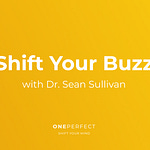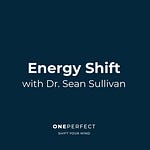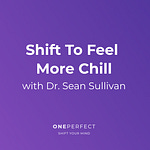Prologue —
This Shift is fairly simple. In fact, most effective emotion management strategies are fairly simple.
When you are caught in an emotional tornado it’s usually hard to remember (or implement) any strategy — never mind a complicated one.
So, shifting is about noticing your inner world state in real time. And then bringing enough presence to your inner world that you can experience your current state of mind and body more clearly.
Just doing that — observing your inner world — has an immediate initial emotional impact on you.
Intentionally observing your inner world when you’re caught up emotionally also helps you listen to yourself long enough to remember any strategy you might have developed for shifting your state — such as the one you’ll develop today.
Bringing presence to inner chaos allows you choose your best next step in real time.
So, what will your next inner world step be?
Let’s begin by taking a long deep breath…
Shift Out of Anger
Hey there, how are you?
Maybe you're angry at the moment — if you're here to do a shift out of anger?
Or, maybe you’re curious about how to deal with anger the next time it arises.
Either way, this Shift will be useful.
Let's listen to the ocean for a minute together — or at least for 10 seconds to get started.
Start to create a little space between you and your current emotion.
—
Take a minute to make a small shift to your state — a mini-shift.
Picture the waves rolling in in your mind.
Close your eyes if you want.
—
Now let's go inside and get specific about how you're going to shift out of anger whenever you choose to.
Set the intention — it's implicit already, but get explicit with setting an intention to shift into a different state.
Shift out of anger.
Relax your body.
Relax into whatever you're sitting or lying on — or even if you walking, relax your shoulders and neck.
Relax into your environment.
Melt into it.
You're part of life.
Be present to it.
—
Okay.
In your personal life, it can be difficult to notice when you're repeating an old pattern that has repeatedly not worked for you.
So that's what we want to focus on doing today — notice and change any such pattern.
If you're angry, it's worth taking that anger as a cue that trying to shift the anger by making a different choice than you typically do is a good idea — even though it likely will feel very uncomfortable to do that.
So let's do an experiment.
Think of it as an experiment in ignoring the emotional experience that's moved you to make a choice that hasn't served you well in the past — that has kept you in anger, or contributed to repeating the anger.
Not that there aren't times that anger is justified.
But whatever you're feeling right now let's experiment with a new way to address it.
If you’re not actually angry right now, imagine something that has made you unreasonably angry — you can work with that today.
In years of doing psychotherapy, I've seen repeatedly that patients who make the most progress are the ones who are able to test out changes to their unhelpful and unwanted patterns — both emotional patterns and also changes to their behavior patterns — how they choose to act, or react, once they have a feeling.
These folks are able to figure out how to move through emotions that have been pushing them in an unhelpful direction — often for many years.
And they're able to do that not just during our therapy sessions — when they're done with the sessions they're able to remember their intention to deal with things in a new way by experimenting.
The truth is, anyone can do that. You just have to get clear on your intention and then stick with it.
It's worth trying something new, if you're finding that a particular unwanted emotion, or sequence of emotions, or pattern is repeating — like anger.
Setting a new intention might not work.
But the likely worst case if you experiment is that you'll learn something new about what happens when you make a different choice.
And just from demonstrating the capacity to choose something different, you'll have opened a whole new world of possibility for yourself.
At best, you'll find that the approach that you experimented with worked better than the old one you've used.
So, now is the time to try a new approach — to experiment.
Is there anything that you want to plan ahead for?
Let’s use this time to plan ahead for the next time you get stressed out or frustrated.
Take 20 seconds in silence to think about the right new approach for you.
What would you want to do next time you get angry?
Make a plan for how you will react differently when you notice that anger arising next time.
What are you going to do with it?
Then, let's commit to implementing a new strategy.
Alright?
So first, take a little time to consider this emotional pattern that you want to experiment with.
How are you going to deal with it differently this time and next time?
—
—
What are you going to do?
Are you going to take time away?
Are you going to shift to doing something else?
Are you going to go for exercise?
Are you going to talk about it?
Are you going to take a long break away from it?
Or, are you just going to recognize that you have the ability to choose how you respond in this moment?
It’s up to you to develop your own plan and set your own intention — because when you're angry, you're not going to be told what to do by anyone.
So make your own choice and start a new experiment by intending a new behavior.
Make a new plan by setting your intention before it happens next time.
Ready?
Take some time in silence to set a new intention as to how you’ll deal with anger next time you notice it arising.
—
Maybe a few deep breaths and just drop into it and notice.
What new intention is desirable?
Got it?
OK, write it down or record it to help yourself remember it.
As my little sister likes to say, ‘Future You’ will appreciate anything you do to make it easier to recall your strategy later — because it’s always hard to remember a plan when you’re getting angry.
We all know that.
Did you write your plan in a place where you’ll see it when you’re getting angry next time?
—
Pro Tip — Record your intention and plan in your OnePerfect app’s private audio journal. I dropped the app links at the end of this Shift.
—
Good.
Okay, here's the big question —
Are you feeling less angry now — because you're being solution focused about this?
I hope you do.
I hope doing some reflective planning worked for you.
That's usually how it works with anger.
You can take some control of it that way anytime.
Good luck breaking the anger pattern.
Good luck sticking with your intention for the rest of the day — and the next time the anger arises.
Have a good one.
Sean
PS. Continue with personalized shifts in OnePerfect’s iPhone or Android apps.
The OnePerfect app for shifting your state of mind is free if your employer, school, or other organization subscribes.
Contact us for a team trial or try it for yourself on iPhone or Android.












